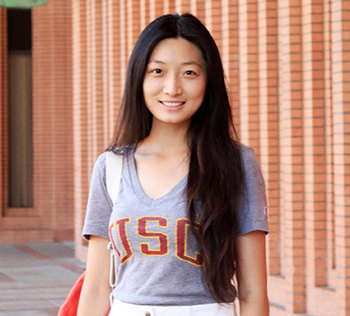
Gina Jin
For public policy student Ge (Gina) Jin, coming all the way to Los Angeles from China for graduate school meant a lot of changes. Luckily, she found a community of like-minded people at USC Shoah Foundation.
“As an international student, we always have a rough time getting used to life here in the United States,” she said. “So I think this is a really nice home.”
What allowed Jin to feel so at home was the diverse group of people working at the Institute.
“I took a class about the cultural competency, and in that class we were asked to talk about the best experience we had in an organization in terms of diversity,” she said. “I think that USC Shoah Foundation is the place [for me] because the interns all come from different countries.”
Jin started interning at USC Shoah Foundation after she took a tour of the Institute because a friend back in China had told her about it. She immediately liked the work they were doing, and asked if she could be a part of it. One intern application later, Jin began to work at the Institute, where she remained for a year.
During her tenure as a USC Shoah Foundation intern, Jin researched the Nanjing Massacre, helped translate from Mandarin to English, wrote summaries for several of the testimonies, and helped to organize meetings with visitors from China.
“I watched about 30 testimonies from the Nanjing Massacre and the Holocaust, and I was really moved by the testimony,” she said. “Before I came to the foundation, just from reading a book or listening to people I didn’t have this real experience of hearing what was going on and what people were doing about it.”
"I want to become someone who has my own opinion about a problem.”
In May, Jin will graduate with her master’s degree and return to China. Though she studied journalism as an undergraduate student and interned for a news network and online news outlet there, her time as a public policy student and interning at USC Shoah Foundation have inspired her to be on other side of the camera, per se.
“As a journalist you’re kind of outside of the whole thing,” she said. “You are not allowed to speak your own opinions, you interview different kinds of people and write about them. But I want to become someone who has my own opinion about a problem.”
She believes USC Shoah Foundation equipped her with the tools to do just that.
“The concept and value of preserving history and understanding what people were suffering before and having sympathy for other people is part of what I want to do,” she said. “For me, my major of public policy is about wanting to make the world a better place.”